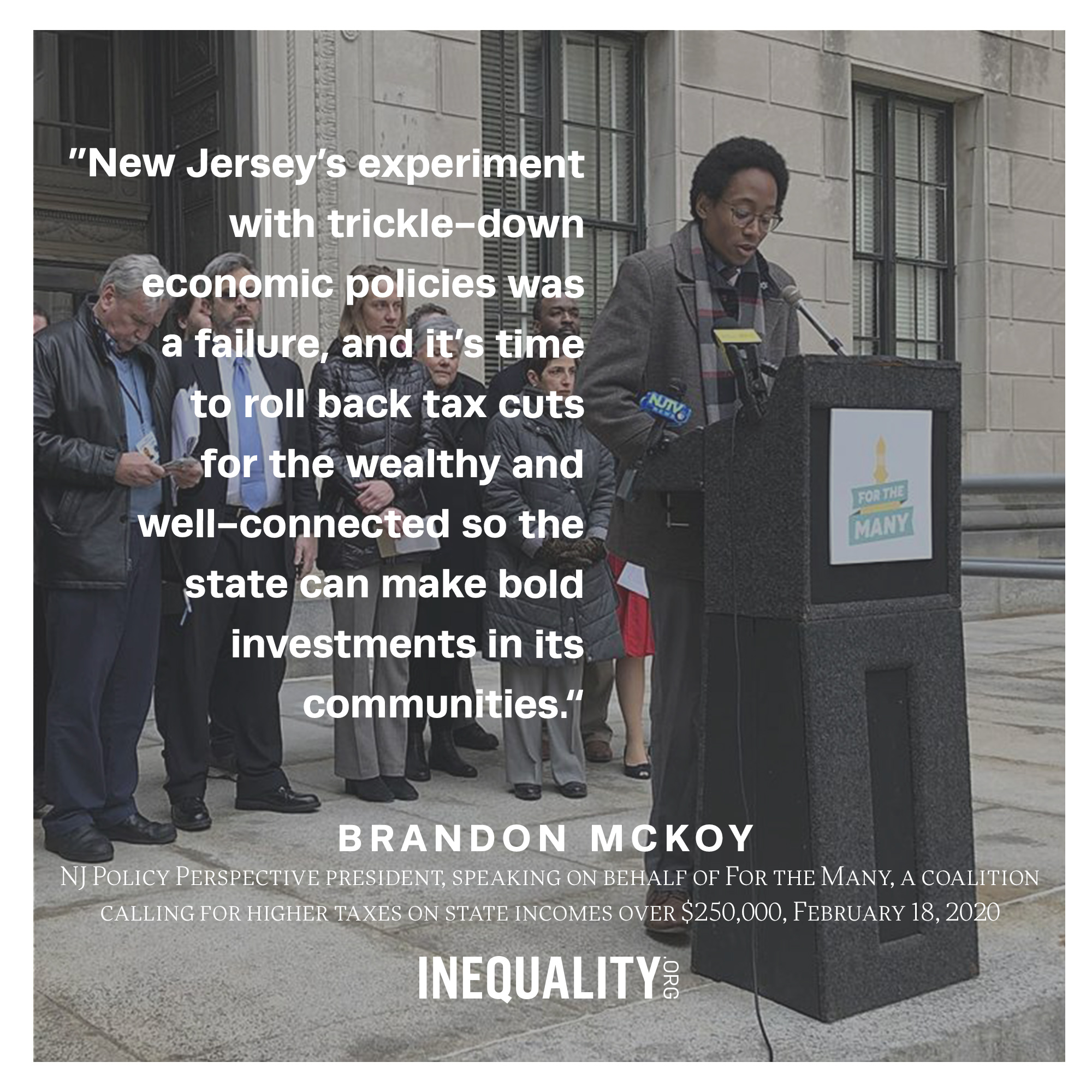| THIS WEEK |
Does the world belong to us or the billionaires? Author Anand Giridharadas has just posed that question in the New York Times. The 2020 presidential election, Giridharadas opines, has essentially become a referendum on billionaires!
Giridharadas goes on to list the questions that few voters this year will be able to avoid. Among them: Should we have billionaires at all? Does wealth make you more immune or more prone to corruption? Can we enhance the well-being of the millions “locked in the basement of opportunity” without confronting our billionaire problem?
My colleague Sam Pizzigati has shared a few data points relevant to these questions on social media. And we’ve got much more on billionaires in this week’s issue for those of you still contemplating your answers.
Chuck Collins, for the Institute for Policy Studies Inequality.org team
|
|
| |
|
| INEQUALITY BY THE NUMBERS |
 |
|
|
|
| |
|
| FACES ON THE FRONTLINES |
 |
| A Cross-Border Campaign for Wine Worker Rights |
| South Africa’s wine industry has seen echoes of apartheid in recent years, and a recent investigative documentary is casting light on abuses that range from wage theft and union busting to health and safety violations. The film, part of a cross-border campaign, is connecting worker groups in wine-producing regions with solidarity campaigns in the areas that consume wine. Activists in South Africa are working with consumers in Scandinavia, where around 10 percent of South African wine exports are consumed, to demand better regulation of supply chains. We have more this week on the worker drive to create more progressive labor laws and better enforce existing labor standards |
|
| |
|
| WORDS OF WISDOM |
 |
|
|
|
| |
|
PETULANT PLUTOCRAT
OF THE WEEK |
 |
| No Smiling These Days for Dentistry’s ‘Disrupter’ |
| Can straightening teeth generate billion-dollar fortunes? Sure can, if you add into the mix a veteran CEO “disrupter” like David Katzman. Katzman’s son Jordan and his pal Alex Fenkell did just that after they founded the SmileDirectClub, a flashy firm that prescribes and sells dental aligners without in-person examinations. Last September, the firm’s initial Wall Street stock offering left CEO Katzman and SmileDirect’s two 30-year-old cofounders with over $1 billion each. But then things went south. In October, California enacted legislation that more tightly regulates “teledentistry.” Then last week the California attorney general issued a complaint that hit SmileDirect’s chief clinical officer for his “gross negligence” toward patients. Also in the news: charges that dissatisfied SmileDirect customers who want their money back must agree they won’t post negative comments online. CEO Katzman’s reaction to all this? He exploded after NBC News aired what he called a “one-sided, biased” attack on his industry-disrupting enterprise. SmileDirect shares have now sunk 33 percent since last September. |
|
| |
|
| GREED AT A GLANCE |
 |
|
|
|
| |
|
| TOO MUCH |
 |
| What Billionaires Really Love About Hard Work |
| Does Michael Bloomberg deserve his $62-billion personal fortune? Bloomberg answered affirmatively at last week’s Democratic presidential candidate debate. After all, he explained, “I worked very hard for it.” Sheer “hard work” has been the go-to justification for grand private fortune ever since the days of America’s original Gilded Age. In America, the old saw goes, anybody can get rich. You just need to put your shoulder to the wheel, your nose to the grindstone. That true? Inequality.org co-editor Sam Pizzigati has more about what the rich deserve. |
|
|
|
| |
|
| MUST READS |
This week on Inequality.org
Chuck Collins, The U.S. Would Be Better Off With Fewer Billionaires. Living under an oligarchic system, we should develop a healthy skepticism of the actions of billionaires, whether they are running for office, bankrolling other candidates, or giving billions to charity.
William Minter and Imani Countess, How National and Global Inequalities Are Intertwined. U.S. activists need to understand how corruption, oligarchy, and inequality at the national level are tied to similar patterns around the world.
Elsewhere on the Web
Laurie Macfarlane, To tackle inequality, we need to start talking about where wealth comes from, Open Democracy. You don’t become a billionaire through labor. You become a billionaire through inheritance, corruption, or economic rents — or some mixture of all three.
Matt Karp, Frederick Douglass Railed Against Economic Inequality, Jacobin. Newly transcribed articles show this 19th-century giant of justice feared “the unlimited hoarding of wealth.”
Brooke Masters, Supreme Inequality — behind the unjust agenda of America’s highest court, Financial Times. Over the past 50 years, U.S. Supreme Court justices have stripped rights from average families and handed new privileges to the wealthy and the businesses they run.
Joel Kotkin, The Luxury City Is Going Bust, Daily Beast. Cities like New York under Michael Bloomberg focused on luring the ultra rich. Now today homeless shelters sit full while luxury skyscrapers go vacant.
Simon Jenkins, We can’t leave it to billionaires like Bezos and Bloomberg to solve the world’s problems, Guardian. Decent societies raise and allocate revenue from all for the good of all, through democratic debate, not by deciding which policies feel good from the comfort of a yacht.
David Wallace-Wells, Jeff Bezos’s $10 Billion Climate Pledge Is Actually Tiny, New York. Another reason we need a wealth tax: The just announced — and widely ballyhooed — Bezos climate change charitable contribution will offset less than 1 percent of the cost of a Green New Deal.
Jim Tankersley and Ben Casselman, The Liberal Economists Behind the Wealth Tax Debate, New York Times. A new profile of Gabriel Zucman and Emmanuel Saez.
Steve Wamhoff, How Democratic Presidential Candidates Would Raise Revenue, Institute on Taxation and Economic Policy. An updated comparison of candidate plans to better tax the rich.
|
|
| |
|
| A FINAL FIGURE |
 |
|
|
|
| |
|
|